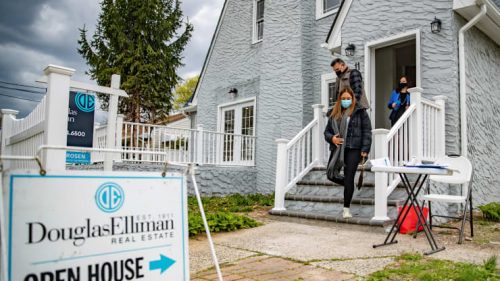With rising inflation and a hot housing market, here’s what you need to know about buying a home right now

Higher prices are almost everywhere.
Americans are paying more these days for products like food and gasoline, thanks to rising inflation.
Of course, this rising inflation will also impact the cost of buying a new home.
“With inflation rising so aggressively and the fact that people’s salaries and weekly income are not rising at the same rate, we end up with less discretionary money to spend each month,” said George Ratiu, manager of economic research at Realtor.com.
At the same time, home prices have also been rising. The consumer price index, which measures the cost of goods and services, shows that shelter rose 0.5% in October. It takes into account rent and owners’ equivalent rent, which is what owners would pay to rent their home.
Separately, home prices were up 19.8% year-over-year in August, according to the S&P CoreLogic Case-Shiller Indices.
So what does this all mean for home buyers?
For one, you may have to lower your budget, Ratiu said.
Not only will you have less money to spend every month, since you are paying higher prices elsewhere, mortgage rates are also climbing. Buyers of a median-priced home are spending $160 more on a monthly mortgage payment than a year ago, a Realtor.com analysis shows. Ratiu expects those rates to continue to climb.
“Generally as we see inflation go higher, we are going to see mortgage rates go higher,” he said.
An inflation hedge
Real estate has historically been viewed as a hedge against inflation.
Home values traditionally at least keep up with inflation, and when you have a mortgage, you lock in a fixed monthly payment for the length of the loan.
“Homes are expensive now … but for most people the comparison that is most important is how that cost of home ownership is going to compare to the cost of renting,” Zillow senior economist Jeff Tucker said.
Rent is more unpredictable than a mortgage and is more likely than not to go up, he said. He anticipates broader inflation will impact rent prices.
“If wages are rising or if the cost of building materials and appliances and light bulbs and paint is rising, all of these to some extent will flow into the cost of maintaining and building rental homes,” Tucker said.
Supply and demand also has an impact on rental prices, which already rose 10.2% nationally in September year over year, according to CoreLogic.
Advice to homebuyers
Whether or not it is worth buying a home right now depends on your situation, Ratiu said.
For most people, owning a home is about having shelter, although historically it has been a good investment. That said, there have also been times when home values have declined, he pointed out.
Therefore, it’s best to think about your budget and your time frame. If you plan to stay there for at least three years to five years, it makes sense, especially in light of favorable interest rates, Ratiu said.
To be sure, buyers have faced stiff competition and bidding wars since there are a limited number of houses on the market. Yet Realtor.com is predicting an easier time by next spring.
A Realtor survey this fall of 1,300 American homeowners found that 26% plan to sell their home in the next 12 months. That’s more than double the findings in its March 2021 survey.
“I think 2022 has the promise of providing less competition, a lot more homes to choose from and, as a result, a lot more approachable prices,” Ratiu said.
That said, there is some good news for those in the market right now. While there are fewer listings to choose from between now and the beginning of January, there are even fewer competing buyers, Tucker said.
“Historically, you are likely to get some of the best bargains of the year,” he said.
Just don’t talk yourself into a house that may not be right for you because it may be available at a good price.
“The house is the place where your family is going to live every day,” Tucker said.
See more at…https://www.cnbc.com/2021/11/23/rising-inflation-hot-housing-market-what-you-need-to-know-about-buying-a-home.html